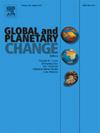Ignoring previous water conditions underestimates global terrestrial ecosystem productivity in severely arid vegetation regions
IF 4
1区 地球科学
Q1 GEOGRAPHY, PHYSICAL
引用次数: 0
Abstract
In the context of global climate change, changes in water conditions significantly affect the productivity of terrestrial ecosystems. However, the impact of previous water conditions has not received sufficient attention. Using machine learning and a large amount of global ground observation data, we evaluated the impact of previous water conditions at various time scales on global productivity estimation through paired experiments and residual comparison methods. By incorporating run theory, we investigated the uncertainty introduced by neglecting previous water conditions in estimating ecosystem productivity across various levels of vegetation drought frequency, intensity, duration, and severity. We found that 36.8 % of global net primary productivity (NPP) is predominantly influenced by water conditions over the previous 24 months, a percentage higher than those observed at 6, 12, and 18-month time. Considering previous water conditions, the estimated global productivity was 66.72 Pg C yr−1 (468.98 g C m−2 yr−1). Neglecting previous water conditions may lead to an underestimation of global productivity by up to 1.27 Pg C(p < 0.05). Regions experiencing severe, prolonged, and intense drought may have significant NPP estimation biases without considering previous water conditions. This study provides an important step toward understanding the impact of previous water conditions and vegetation drought disasters on the carbon sink function of global terrestrial ecosystems.
忽略以前的水条件低估了严重干旱植被区全球陆地生态系统的生产力
在全球气候变化的背景下,水条件的变化显著影响陆地生态系统的生产力。然而,以前的水条件的影响没有得到足够的重视。利用机器学习和大量的全球地面观测数据,我们通过配对实验和残差比较方法,评估了不同时间尺度上以前的水分条件对全球生产力估算的影响。通过结合运行理论,我们研究了在估算不同植被干旱频率、强度、持续时间和严重程度的生态系统生产力时忽略以往水分条件所带来的不确定性。研究发现,在过去的24个月中,36.8%的全球净初级生产力(NPP)主要受水分条件的影响,这一比例高于6、12和18个月的观测结果。考虑到以前的水条件,估计全球生产力为66.72 Pg C yr - 1 (468.98 g C m - 2 yr - 1)。忽略以前的水条件可能导致全球生产力低估高达1.27 Pg C(p <;0.05)。如果不考虑以前的水条件,经历严重、持久和强烈干旱的地区可能会有显著的NPP估计偏差。该研究为理解以往水分条件和植被干旱灾害对全球陆地生态系统碳汇功能的影响提供了重要的一步。
本文章由计算机程序翻译,如有差异,请以英文原文为准。
求助全文
约1分钟内获得全文
求助全文
来源期刊

Global and Planetary Change
地学天文-地球科学综合
CiteScore
7.40
自引率
10.30%
发文量
226
审稿时长
63 days
期刊介绍:
The objective of the journal Global and Planetary Change is to provide a multi-disciplinary overview of the processes taking place in the Earth System and involved in planetary change over time. The journal focuses on records of the past and current state of the earth system, and future scenarios , and their link to global environmental change. Regional or process-oriented studies are welcome if they discuss global implications. Topics include, but are not limited to, changes in the dynamics and composition of the atmosphere, oceans and cryosphere, as well as climate change, sea level variation, observations/modelling of Earth processes from deep to (near-)surface and their coupling, global ecology, biogeography and the resilience/thresholds in ecosystems.
Key criteria for the consideration of manuscripts are (a) the relevance for the global scientific community and/or (b) the wider implications for global scale problems, preferably combined with (c) having a significance beyond a single discipline. A clear focus on key processes associated with planetary scale change is strongly encouraged.
Manuscripts can be submitted as either research contributions or as a review article. Every effort should be made towards the presentation of research outcomes in an understandable way for a broad readership.
 求助内容:
求助内容: 应助结果提醒方式:
应助结果提醒方式:


